-
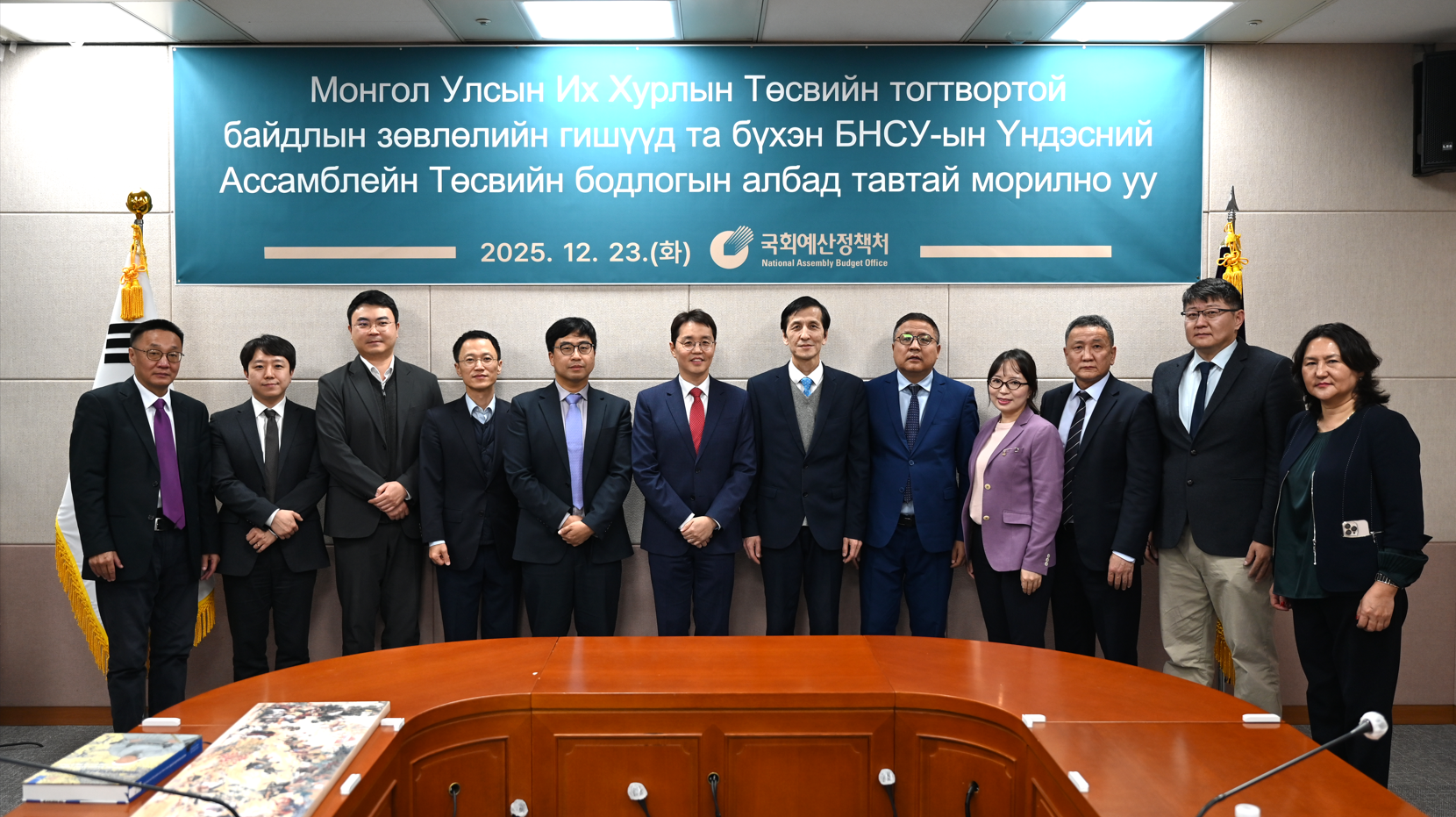
NABO Meets with Mongolian Fiscal Stability Council On December 23rd(Tuesday), NABO met with the Mongolian Fiscal Stability Council (FSC). The meeting was attended by a 6-member Mongolian delegation, including FSC Chairman N.Enkhbayar, along with NABO Acting Director General for Economic Analysis Seungwoo Ye. The FSC and NABO engaged in in-depth discussion on key issues including economic analysis and outlook, mid- to long-term fiscal projection, budget analysis methodology, and the role and function of NABO in parliament’s budget monitoring. In his remarks, Chairman Enkhbayar highlighted the role of the FSC as securing fiscal soundness and sustainability and stated, “this meeting provided an excellent opportunity to find an appropriate policy directions,” and expressed his hope for continued exchange in the future. <!--[data-hwpjson]{ "documentPr": { "di": "", "dp": { "dn": "test.hwp", "ta": 1, "d1": 5, "d2": 1, "dv": 0, "dr": 1, "do": 1, "vj": "1.1", "an": "Hancom Office Hangul", "av": "11, 0, 0, 1623", "ao": "WIN", "ab": "32", "ar": "LE", "as": "Windows_8" }, "dis": false, "ds": { "ti": "", "la": "ko", "cr": "", "su": "", "de": "", "cd": "2025-12-24T13:56:17.738Z", "md": "1601-01-01T09:00:00.000Z", "pd": "1601-01-01T09:00:00.000Z", "ke": "" } }, "dh": { "do": { "pa": 1, "fo": 1, "en": 1, "pi": 1, "tb": 1, "eq": 1 }, "fo": [ ], "cd": { "tp": 0, "lc": { "af": false, "ui": false, "fu": false, "dn": false, "ul": false, "el": false, "at": false, "tq": false, "da": false, "dw": false, "dj": false, "bc": false, "bu": false, "al": false, "ab": false, "ap": false, "an": false, "aa": false, "ds": false, "de": false, "as": false, "cp": false, "ao": false, "et": false, "ay": false, "am": false, "a1": false, "bt": false, "av": false, "dh": false, "dp": false, "d1": false, "mf": false, "bl": false, "ag": false, "dg": false, "ae": false, "df": false, "do": false, "dl": false, "di": false, "d2": false, "d3": false, "ob": false, "d4": false, "ev": false, "d5": false, "d6": false, "a2": false, "dc": false } }, "ld": { "pa": "", "pi": true, "fo": false } }, "bf": { "01DC7491A594E1F000000016": { "id": 1, "td": false, "sh": false, "st": 0, "sc": 0, "si": false, "bt": 0, "bi": false, "cl": 0, "bc": false, "lt": 0, "lw": 0, "lc": 0, "rt": 0, "rw": 0, "rc": 0, "tt": 0, "tw": 0, "tc": 0, "bbt": 0, "bbw": 0, "bbc": 0, "dt": 1, "dw": 0, "dc": 0, "fi": { } }, "01DC7491A594E1F000000017": { "id": 2, "td": false, "sh": false, "st": 0, "sc": 0, "si": false, "bt": 0, "bi": false, "cl": 0, "bc": false, "lt": 0, "lw": 0, "lc": 0, "rt": 0, "rw": 0, "rc": 0, "tt": 0, "tw": 0, "tc": 0, "bbt": 0, "bbw": 0, "bbc": 0, "dt": 1, "dw": 0, "dc": 0, "fi": { "wb": { "fc": 4294967295, "hc": 10066329, "al": 0, "hs": -1 } } } }, "cp": { "01DC7491A594E1F000000018": { "id": 0, "he": 1000, "tc": 0, "sc": 4294967295, "uf": false, "uk": false, "sm": 0, "bf": "01DC7491A594E1F000000016", "f1": "한컴바탕", "t1": 1, "f2": "한컴바탕", "t2": 1, "f3": "함초롬바탕", "t3": 1, "f4": "한컴바탕", "t4": 1, "f5": "한컴바탕", "t5": 1, "f6": "한컴바탕", "t6": 1, "f7": "한컴바탕", "t7": 1, "r1": 100, "r2": 100, "r3": 100, "r4": 100, "r5": 100, "r6": 100, "r7": 100, "s1": 0, "s2": 0, "s3": 0, "s4": 0, "s5": 0, "s6": 0, "s7": 0, "e1": 100, "e2": 100, "e3": 100, "e4": 100, "e5": 100, "e6": 100, "e7": 100, "o1": 0, "o2": 0, "o3": 0, "o4": 0, "o5": 0, "o6": 0, "o7": 0, "it": false, "bo": false, "ut": 0, "us": 1, "uc": 0, "st": false, "ss": 1, "so": 0, "ot": 0, "ht": 0, "hc": 0, "hx": 0, "hy": 0, "em": false, "en": false, "su": false, "sb": false }, "01DC7491A594E1F000000019": { "id": 1, "he": 1300, "tc": 0, "sc": 4294967295, "uf": false, "uk": false, "sm": 0, "bf": "01DC7491A594E1F000000017", "f1": "함초롬바탕", "t1": 1, "f2": "함초롬바탕", "t2": 1, "f3": "함초롬바탕", "t3": 1, "f4": "함초롬바탕", "t4": 1, "f5": "함초롬바탕", "t5": 1, "f6": "함초롬바탕", "t6": 1, "f7": "함초롬바탕", "t7": 1, "r1": 100, "r2": 100, "r3": 100, "r4": 100, "r5": 100, "r6": 100, "r7": 100, "s1": -1, "s2": -1, "s3": -1, "s4": -1, "s5": -1, "s6": -1, "s7": -1, "e1": 100, "e2": 100, "e3": 100, "e4": 100, "e5": 100, "e6": 100, "e7": 100, "o1": 0, "o2": 0, "o3": 0, "o4": 0, "o5": 0, "o6": 0, "o7": 0, "it": false, "bo": false, "ut": 0, "us": 1, "uc": 0, "st": false, "ss": 1, "so": 0, "ot": 0, "ht": 0, "hc": 0, "hx": 0, "hy": 0, "em": false, "en": false, "su": false, "sb": false }, "01DC7491A594E1F00000001A": { "id": 2, "he": 1300, "tc": 0, "sc": 4294967295, "uf": false, "uk": false, "sm": 0, "bf": "01DC7491A594E1F000000017", "f1": "함초롬바탕", "t1": 1, "f2": "함초롬바탕", "t2": 1, "f3": "함초롬바탕", "t3": 1, "f4": "함초롬바탕", "t4": 1, "f5": "함초롬바탕", "t5": 1, "f6": "함초롬바탕", "t6": 1, "f7": "함초롬바탕", "t7": 1, "r1": 100, "r2": 100, "r3": 100, "r4": 100, "r5": 100, "r6": 100, "r7": 100, "s1": -1, "s2": -1, "s3": -1, "s4": -1, "s5": -1, "s6": -1, "s7": -1, "e1": 100, "e2": 100, "e3": 100, "e4": 100, "e5": 100, "e6": 100, "e7": 100, "o1": 0, "o2": 0, "o3": 0, "o4": 0, "o5": 0, "o6": 0, "o7": 0, "it": false, "bo": false, "ut": 0, "us": 1, "uc": 0, "st": false, "ss": 1, "so": 0, "ot": 0, "ht": 0, "hc": 0, "hx": 0, "hy": 0, "em": false, "en": false, "su": true, "sb": false }, "01DC7491A594E1F00000001B": { "id": 3, "he": 1000, "tc": 0, "sc": 4294967295, "uf": false, "uk": false, "sm": 0, "bf": "01DC7491A594E1F000000017", "f1": "함초롬바탕", "t1": 1, "f2": "함초롬바탕", "t2": 1, "f3": "함초롬바탕", "t3": 1, "f4": "함초롬바탕", "t4": 1, "f5": "함초롬바탕", "t5": 1, "f6": "함초롬바탕", "t6": 1, "f7": "함초롬바탕", "t7": 1, "r1": 100, "r2": 100, "r3": 100, "r4": 100, "r5": 100, "r6": 100, "r7": 100, "s1": 0, "s2": 0, "s3": 0, "s4": 0, "s5": 0, "s6": 0, "s7": 0, "e1": 100, "e2": 100, "e3": 100, "e4": 100, "e5": 100, "e6": 100, "e7": 100, "o1": 0, "o2": 0, "o3": 0, "o4": 0, "o5": 0, "o6": 0, "o7": 0, "it": false, "bo": false, "ut": 0, "us": 1, "uc": 0, "st": false, "ss": 1, "so": 0, "ot": 0, "ht": 0, "hc": 0, "hx": 0, "hy": 0, "em": false, "en": false, "su": false, "sb": false } }, "tp": { "01DC7491A59509000000001C": { "id": 0, "al": false, "ar": false, "tp": [ ] } }, "nu": { }, "bu": { }, "pp": { "01DC7491A59509000000001D": { "id": 0, "ah": 0, "av": 0, "ht": 0, "hi": "", "hl": 0, "tp": "01DC7491A59509000000001C", "kb": 0, "kn": true, "ko": false, "kk": false, "kl": false, "kp": false, "kw": 0, "co": 0, "fl": false, "st": true, "sl": false, "ae": false, "aa": false, "mi": 0, "ml": 0, "mr": 0, "mp": 0, "mn": 0, "lt": 0, "lv": 160, "bf": "01DC7491A594E1F000000016", "bl": 0, "br": 0, "bt": 0, "bb": 0, "bc": false, "bi": false }, "01DC7491A59509000000001E": { "id": 1, "ah": 0, "av": 0, "ht": 0, "hi": "", "hl": 0, "tp": "01DC7491A59509000000001C", "kb": 0, "kn": true, "ko": false, "kk": false, "kl": false, "kp": false, "kw": 0, "co": 0, "fl": false, "st": true, "sl": false, "ae": false, "aa": false, "mi": 0, "ml": 0, "mr": 0, "mp": 0, "mn": 0, "lt": 0, "lv": 160, "bf": "01DC7491A594E1F000000017", "bl": 0, "br": 0, "bt": 0, "bb": 0, "bc": false, "bi": false } }, "st": { "01DC7491A59509000000001F": { "id": 0, "ty": 0, "na": "바탕글", "en": "Normal", "pp": "01DC7491A59509000000001E", "cp": "01DC7491A594E1F00000001B", "ns": "01DC7491A59509000000001F", "li": 1042, "lf": false } }, "mp": { }, "ro": { "hp": "01DC7491A594E1F00000000E", "01DC7491A594E1F00000000E": { "np": "01DC7491A594E1F00000000F", "id": 0, "pp": "01DC7491A59509000000001E", "si": "01DC7491A59509000000001F", "bf": 3, "ru": [ { "cp": "01DC7491A594E1F000000019", "ch": [ { "cc": 2, "ci": 1936024420, "co": "01DC7491A594E1F00000000C" } , { "cc": 2, "ci": 1668246628, "co": "01DC7491A594E1F00000000D" } , { "t": "On December 23" } ] } , { "cp": "01DC7491A594E1F00000001A", "ch": [ { "t": "rd" } ] } , { "cp": "01DC7491A594E1F000000019", "ch": [ { "t": " (Tuesday), NABO met with the Mongolian Fiscal Stability Council (FSC)." } ] } ] }, "01DC7491A594E1F00000000F": { "np": "01DC7491A594E1F000000010", "id": -2147483648, "pp": "01DC7491A59509000000001E", "si": "01DC7491A59509000000001F", "bf": 0, "ru": [ { "cp": "01DC7491A594E1F000000019", "ch": [ { "t": "" } ] } ] }, "01DC7491A594E1F000000010": { "np": "01DC7491A594E1F000000011", "id": -2147483648, "pp": "01DC7491A59509000000001E", "si": "01DC7491A59509000000001F", "bf": 0, "ru": [ { "cp": "01DC7491A594E1F000000019", "ch": [ { "t": "The meeting was attended by a 6-member Mongolian delegation, including FSC Chairman N.Enkhbayar, along with NABO Acting Director General for Economic Analysis Seungwoo Ye." } ] } ] }, "01DC7491A594E1F000000011": { "np": "01DC7491A594E1F000000012", "id": -2147483648, "pp": "01DC7491A59509000000001E", "si": "01DC7491A59509000000001F", "bf": 0, "ru": [ { "cp": "01DC7491A594E1F000000019", "ch": [ { "t": "" } ] } ] }, "01DC7491A594E1F000000012": { "np": "01DC7491A594E1F000000013", "id": -2147483648, "pp": "01DC7491A59509000000001E", "si": "01DC7491A59509000000001F", "bf": 0, "ru": [ { "cp": "01DC7491A594E1F000000019", "ch": [ { "t": "The FSC and NABO engaged in in-depth discussion on key issues including economic analysis and outlook, mid- to long-term fiscal projection, budget analysis methodology, and the role and function of NABO in parliament’s budget monitoring." } ] } ] }, "01DC7491A594E1F000000013": { "np": "01DC7491A594E1F000000014", "id": -2147483648, "pp": "01DC7491A59509000000001E", "si": "01DC7491A59509000000001F", "bf": 0, "ru": [ { "cp": "01DC7491A594E1F000000019", "ch": [ { "t": "" } ] } ] }, "01DC7491A594E1F000000014": { "np": "01DC7491A594E1F000000015", "id": -2147483648, "pp": "01DC7491A59509000000001E", "si": "01DC7491A59509000000001F", "bf": 0, "ru": [ { "cp": "01DC7491A594E1F000000019", "ch": [ { "t": "In his remarks, Chairman Enkhbayar highlighted the role of the FSC as securing fiscal soundness and sustainability and stated, “this meeting provided an excellent opportunity to find an appropriate policy directions,” and expressed his hope for continued exchange in the future." } ] } ] }, "01DC7491A594E1F000000015": { "np": "", "id": -2147483648, "pp": "01DC7491A59509000000001D", "si": "01DC7491A59509000000001F", "bf": 0, "ru": [ { "cp": "01DC7491A594E1F000000018", "ch": [ { "t": "" } ] } ] } }, "sl": { }, "cs": { "01DC7491A594E1F00000000C": { "cc": 2, "ci": 1936024420, "td": 0, "tv": false, "sc": 1134, "ts": 8000, "ms": "", "os": "", "gl": 0, "gc": 0, "gw": false, "ns": 0, "np": 0, "ni": 0, "nt": 0, "ne": 0, "hh": false, "hf": false, "hm": false, "fb": false, "hb": false, "fi": false, "hi": false, "hp": false, "he": false, "sl": false, "lr": 0, "lc": 0, "ld": 0, "ls": 0, "pp": { "ls": false, "wi": 59528, "he": 84188, "gt": 0, "ml": 8504, "mr": 8504, "mt": 5668, "mb": 4252, "mh": 4252, "mf": 4252, "mg": 0 }, "fn": { "at": 0, "au": "", "ap": "", "ac": ")", "as": false, "ll": -1, "lt": 1, "lw": 1, "lc": 0, "sa": 850, "sb": 567, "st": 283 , "nt": 0, "nn": 1, "pp": 0, "pb": false }, "en": { "at": 0, "au": "", "ap": "", "ac": ")", "as": false, "ll": -4, "lt": 1, "lw": 1, "lc": 0, "sa": 850, "sb": 567, "st": 0 , "nt": 0, "nn": 1, "pp": 0, "pb": false }, "pb": [ { "ty": 0, "bf": "01DC7491A594E1F000000016", "tb": true, "hi": false, "fi": false, "fa": 0, "ol": 1417, "or": 1417, "ot": 1417, "ob": 1417 }, { "ty": 1, "bf": "01DC7491A594E1F000000016", "tb": true, "hi": false, "fi": false, "fa": 0, "ol": 1417, "or": 1417, "ot": 1417, "ob": 1417 }, { "ty": 2, "bf": "01DC7491A594E1F000000016", "tb": true, "hi": false, "fi": false, "fa": 0, "ol": 1417, "or": 1417, "ot": 1417, "ob": 1417 } ], "mp": [ ] } , "01DC7491A594E1F00000000D": { "cc": 2, "ci": 1668246628, "ty": 0, "la": 0, "co": 1, "ss": true, "sg": 0, "lt": 0, "lw": 0, "lc": 0, "cs": [ ] } }, "bi": [ ], "bidt": { } }--> 2025-12-24
-
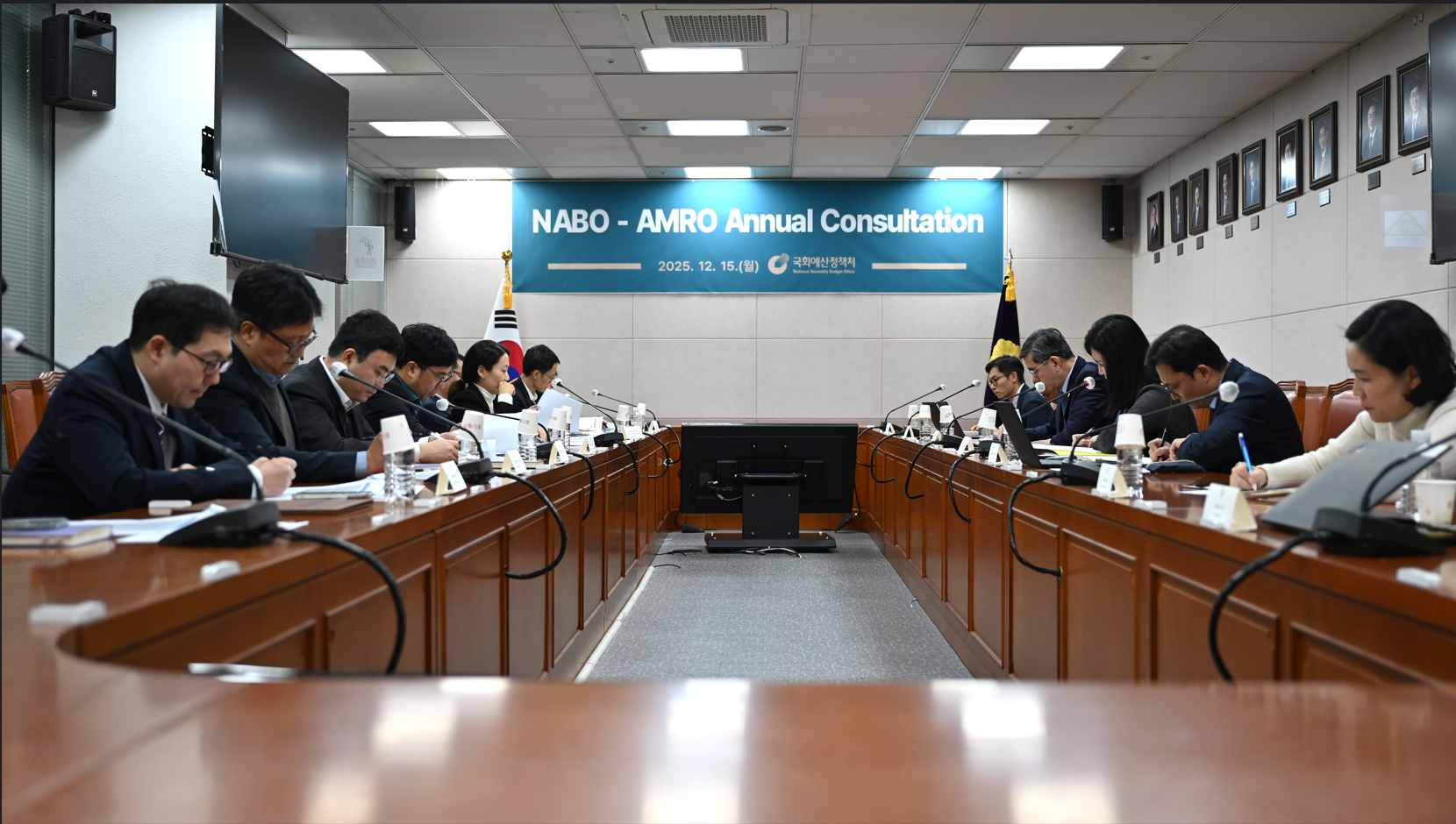
NABO Holds Annual Consultation with AMRO The National Assembly Budget Office (Chief Dongha Chi) held its annual consultation with the ASEAN+3 Macroeconomic Research Office (AMRO) on Monday, December 15. AMRO is an international organization headquartered in Singapore, comprising ten ASEAN nations (Laos, Malaysia, Myanmar, Vietnam, Brunei, Singapore, Indonesia, Cambodia, Thailand, the Philippines), along with Korea, China, and Japan. The organization focuses on macroeconomic monitoring and crisis prevention in the region and conducts annual consultations with member countries to review their fiscal and economic trends. Ahyoung Kwon, Director of Tax and Estimates Coordination Division, and Kian-Heng Peh, Group Head of AMRO Mission Team, led the meeting. The consultation covered several key topics, including NABO’s revenue and expenditure projections for 2025 and 2026, our overlook for fiscal balances and debt, current status on fiscal rules introduction for ensuring fiscal sustainability, reform plans for tax/pension/social insurance, and improvement measures for local finances. The AMRO Mission team noted that "while we understand it would be difficult for Korea to introduce fiscal rules in the short term to curb debt growth, given the persistent upward trend in debt, there is a need to adopt fiscal rules and establish a debt ceiling in the medium to long term." NABO concurred with this view and proposed discussing the feasibility of introducing such measures in Korea while sharing examples of fiscal rule implementation from other countries that AMRO has studied. Concluding the meeting, Group Head Kian-Heng Phe stated, "The experts at NABO have been tremendously helpful in understanding and forecasting Korea's fiscal and economic situation," and expressed his hope that "exchanges and cooperation between our two organizations will continue to deepen in the future." 2025-12-16
-
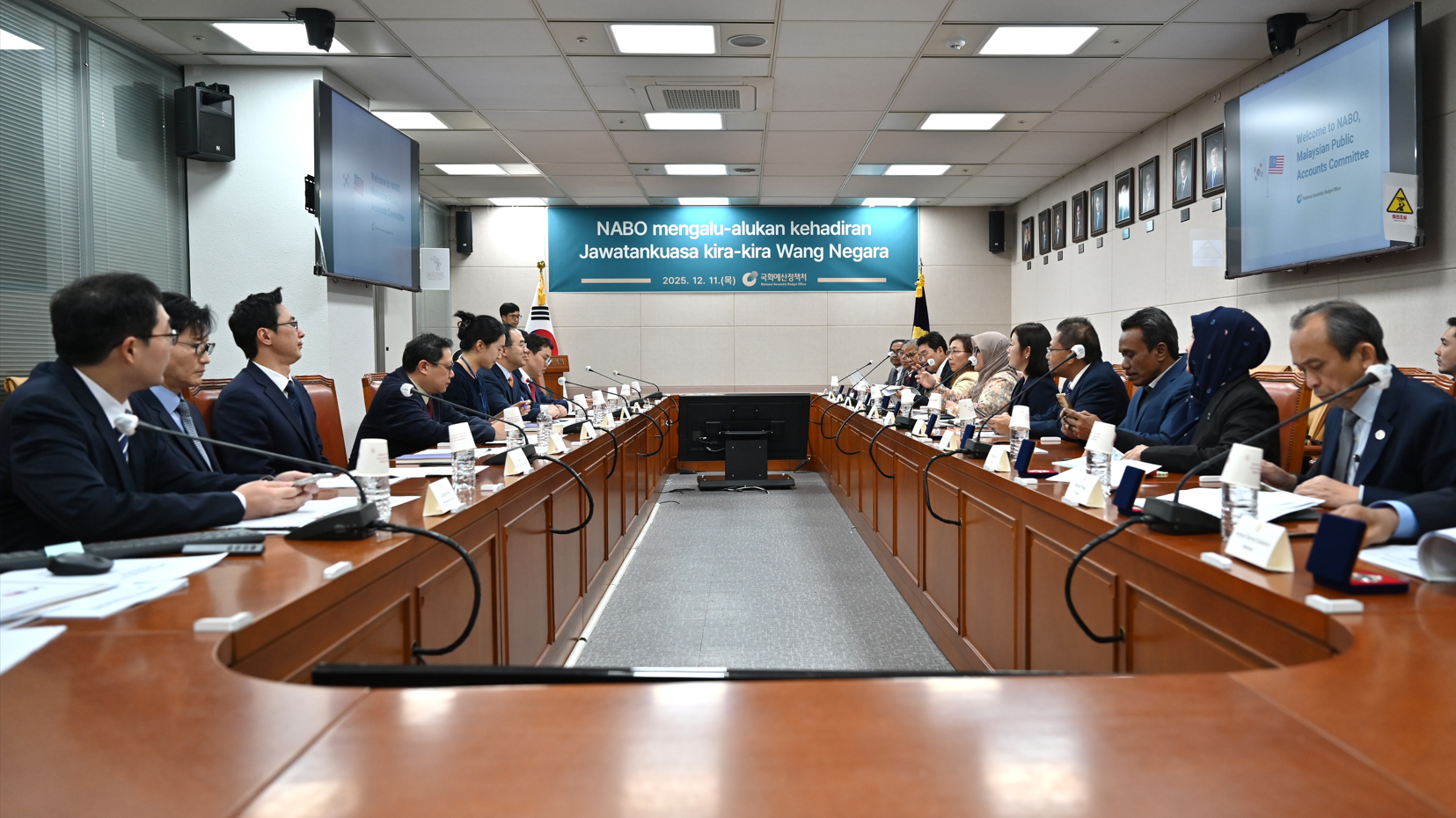
NABO Meets with Malaysian House of Representatives Public Accounts Committee On December 11th (Thursday), NABO met with the Malaysian delegation from the House of Representatives Public Accounts Committee (PAC). The meeting was attended by a 15-member Malaysian delegation, including PAC Chair Mas Ermieyati binti Samsudin, along with NABO Chief Dong-ha Chi and Director General for Planning and Management Sung-min Yoon. The Malaysian delegation and NABO engaged in in-depth discussions on key issues including the primary roles of parliamentary budget offices, ways to strengthen independence, and measures to enhance parliamentary review of budgets and settlement accounts. In his remarks, Chief Chi stated, "At a time when the role of parliaments in ensuring fiscal accountability and efficiency has become increasingly important as national debts have risen globally since COVID-19, I expect that sharing NABO's knowledge and experience in fiscal analysis and evaluation will greatly contribute to strengthening the capacity of both parliaments and improving the efficiency of national fiscal management." Chair Mas Ermieyati stated, "This meeting provided an excellent opportunity to learn from NABO's best practices, work experience, and expertise," and expressed her hope for continued exchange in the future. 2025-12-12
-
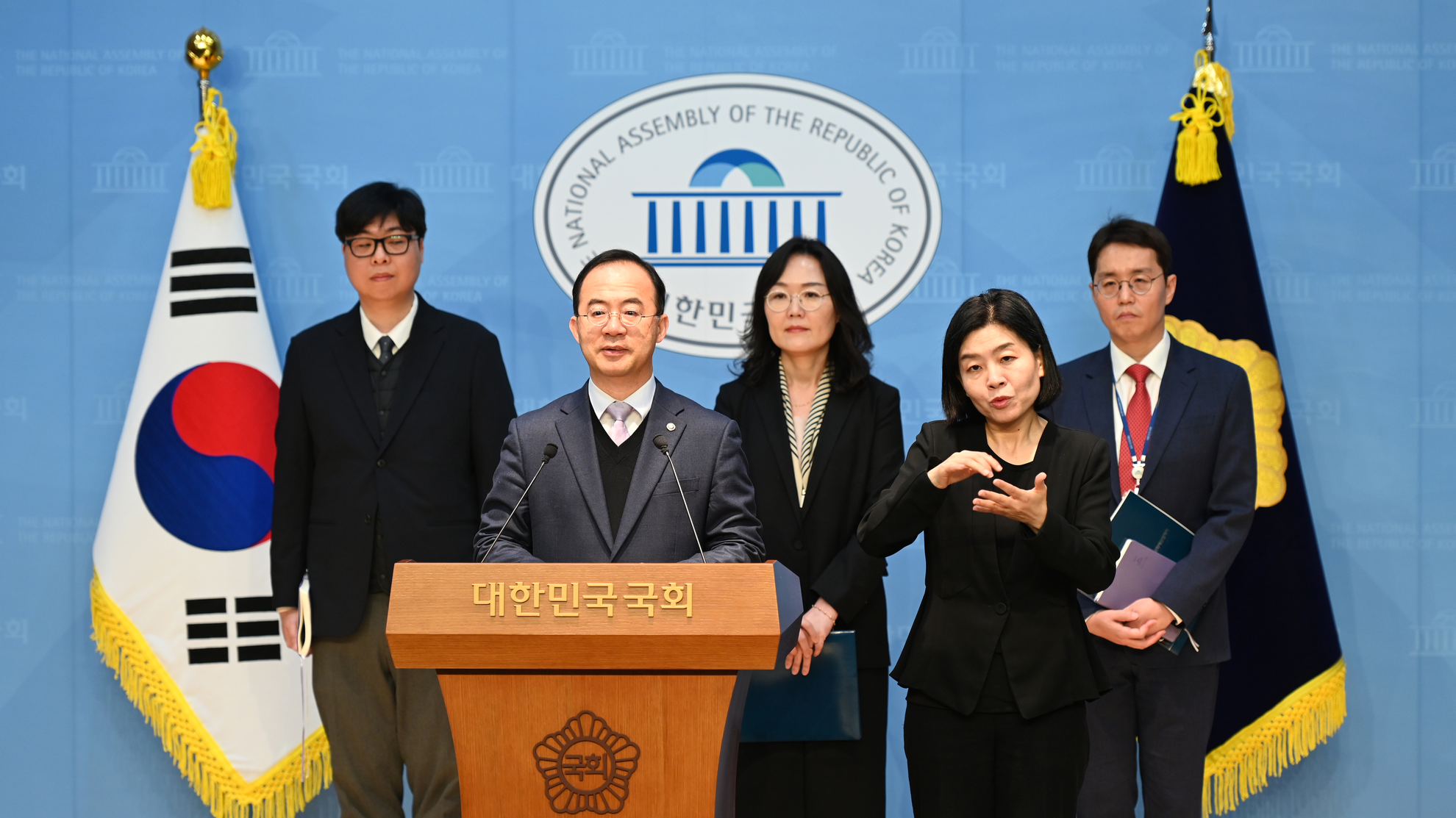
Press Conference on NABO Demographic Outlook: 2025-2045 On December 11th (Thursday), NABO held a press conference to announce the publication of the NABO Demographic Outlook: 2025-2045. The press conference began with opening remarks by NABO Chief Dongha Chi, followed by a briefing on the report by Gahyeong Hur, Director of the Population Strategy Analysis Division, which introduced the key findings on future changes in Korea’s population size and structure. Chief Chi stated, “Given that population is a fundamental variable for the economy and public finance—affecting production, consumption, taxation, and welfare—it is highly significant that a National Assembly institution now independently conducts demographic outlook.” Director Hur added, “Our demographic projections cover the next two decades and will serve as baseline data for diagnosing Korea’s socioeconomic changes and formulating policy responses.” 2025-12-12
-
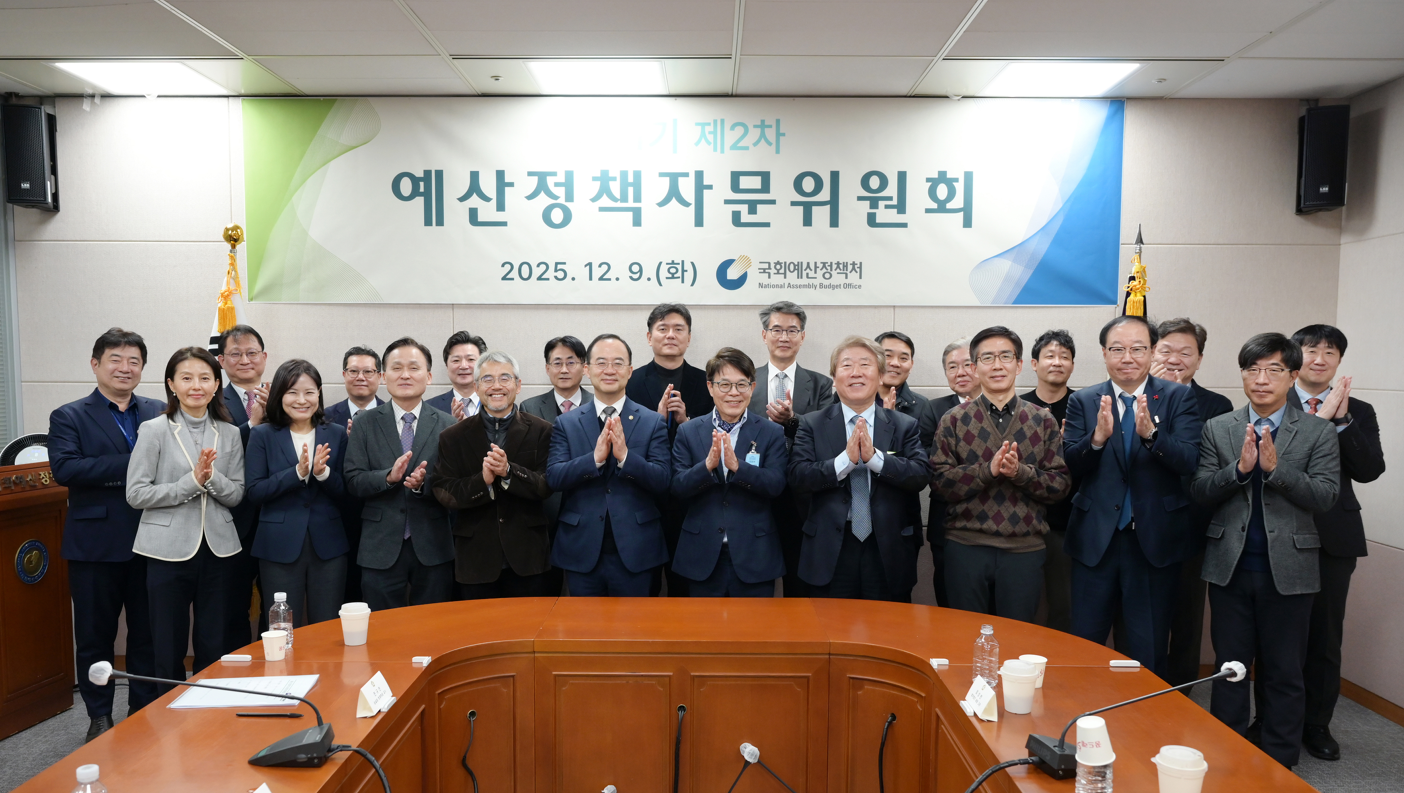
NABO Holds the 2nd Meeting of the 11th Budget Policy Advisory Committee On December 9th (Tuesday), the National Assembly Budget Office held the second meeting of its 11th Budget Policy Advisory Committee, composed of 19 experts from finance, economics, science, technology, environment, energy, and public administration. The meeting was attended by 16 advisory committee members, including Committee Chair Tobin Im, along with 8 staff members from NABO, including Chief Dong-ha Chi. In-depth discussions were held on the following topics: ① NABO's research agenda for 2026, ② economic trends for 2026, ③ medium- to long-term tax reform tasks, ④ local fiscal system improvement measures, and ⑤ strategies to revitalize the Budget Policy Advisory Committee. At the meeting, the advisory committee members noted that NABO's growing prominence is evident in how its analyses—including budget reviews, cost estimates, and revenue projections—have increasingly become matters of public interest and are actively reflected in government policies. They recommended that NABO continue to strengthen its analysis of issues of high social concern, such as the climate crisis, population decline, and Korea-U.S. trade issues, while also conducting objective analyses of socially sensitive tax areas including inheritance tax, property tax, and financial investment income tax. Chief Chi stated, "At a time when the domestic and international economic environment faces complex risks and structural transitions, forecasting future economic conditions and securing a stable revenue base for sustainable fiscal policy is more critical than ever. Based on the valuable insights of our advisory committee members, we will continue to enhance our expertise and capacity to support the National Assembly." [List of Committee Members in Attendance (16 in random order)] Tobin Im, (Chairperson) Professor, Seoul National University Graduate School of Public Administration, Yeongjin Gwon, Advisor, Samsung Life Insurance, Shiho Kim, Professor, School of Integrated Technology, Yonsei Univertisy, Youngse Kim, Professor, School of Economics, Sungkyunkwan University, Jhungsoo Park, Professor, Department of Public Administration, Ewha Womans University, Hyungjun Park, Professor, Department of Public Administration, Sungkyunkwan University, Seongbin Yim, Advisor, Shin & Kim LLC, Kyuan Jeon, Professor, Department of Accounting, Soongsil University, Chunglae Cho, Professor, Department of Public Administration, Ewha Womans University, Chul Choi, Professor, Department of Consumer Economics, Sookmyung Women’s University, Hyangmi Choi, Professor, School of Business, Chungnam National University, Geejoo Ha, Collaboration Professor, Hanyang University, Eunnyeong Heo, Professor, Department of Energy Resources Engineering, Seoul National University, Jung Hur, Professor, Department of Economics, Sogang University, Sunghoon Hong, Professor, Department of Science in Taxation, University of Seoul, Jongho Hong, Professor, Seoul National University Graduate School of Environmental Studies. 2025-12-10
-
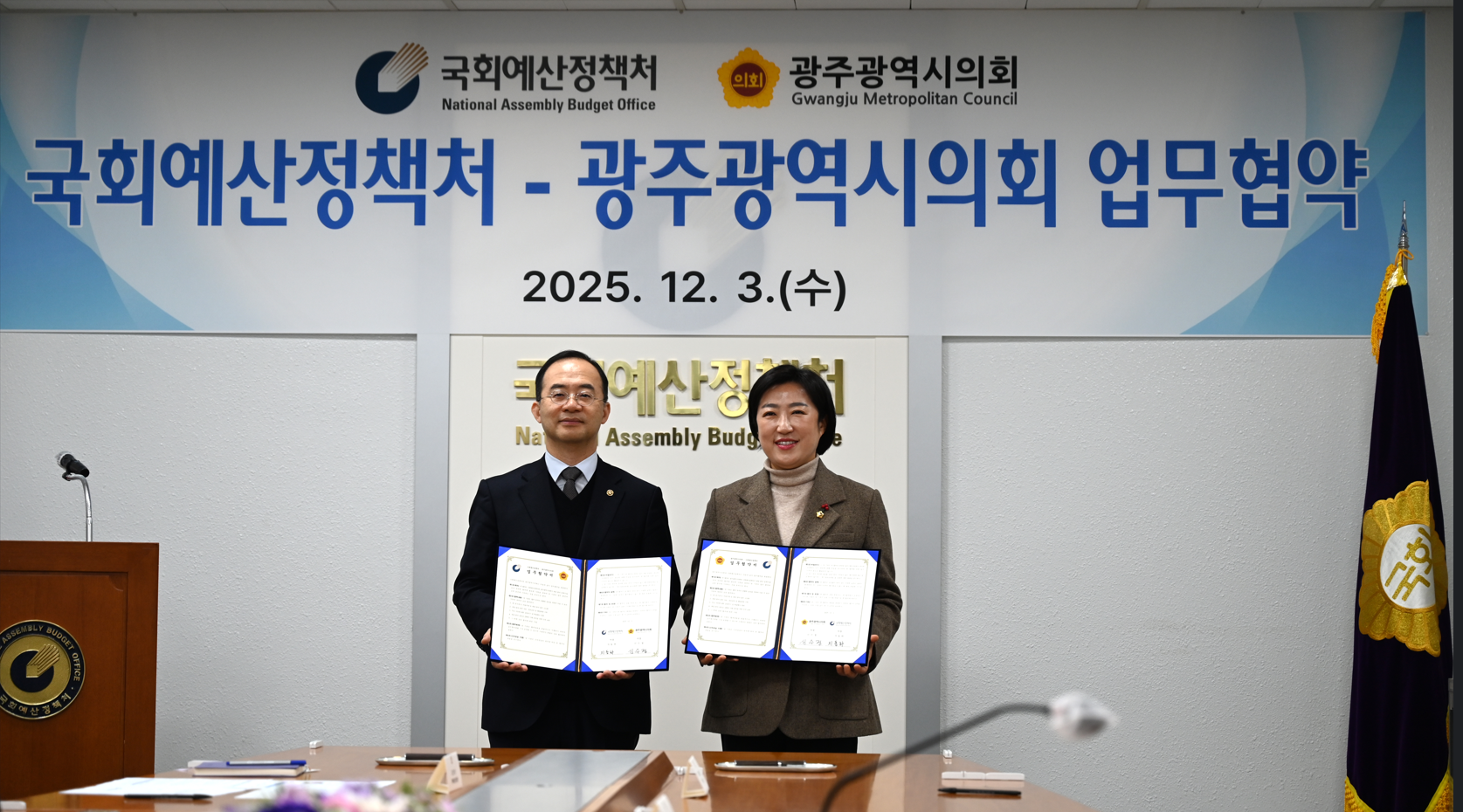
MOU Signed with Gwangju Metropolitan Council NABO signed a memorandum of understanding (MOU) with the Gwangju Metropolitan Council for cooperation in fiscal affairs at the National Assembly Office Building on Wednesday, December 3. This agreement was arranged to contribute to business development and enhanced exchanges through cooperation in fiscal analysis between NABO and the Gwangju Metropolitan Council. The ceremony was attended by NABO Chief Chi Dong-ha and Director General of the Planning and Management Department Yoon Sung-min, along with Gwangju Metropolitan Council Chairperson Shin Su-jeong and Secretary General Park Nam-eon. Going forward, the two institutions plan to cooperate through ▲ advancement of fiscal affairs including budget and settlement analysis and cost estimation, ▲ sharing of fiscal data and information and establishment of a collaborative system, ▲ personnel exchanges and joint academic conferences to strengthen fiscal expertise and promote understanding. At the signing ceremony, Chief Chi stated, "NABO will actively work to ensure mutual development of both institutions by using this agreement with the Gwangju Metropolitan Council as an opportunity to discuss budget and settlement, cost estimation, and local fiscal issues together, and to explore directions for development." Chairperson Shin remarked, "I expect that today's agreement with NABO will serve as an opportunity to strengthen budget review and fiscal oversight to ensure citizens' finances are spent responsibly, while also becoming a starting point for enhancing fiscal capacity to prepare for the region's future." 2025-12-04
-
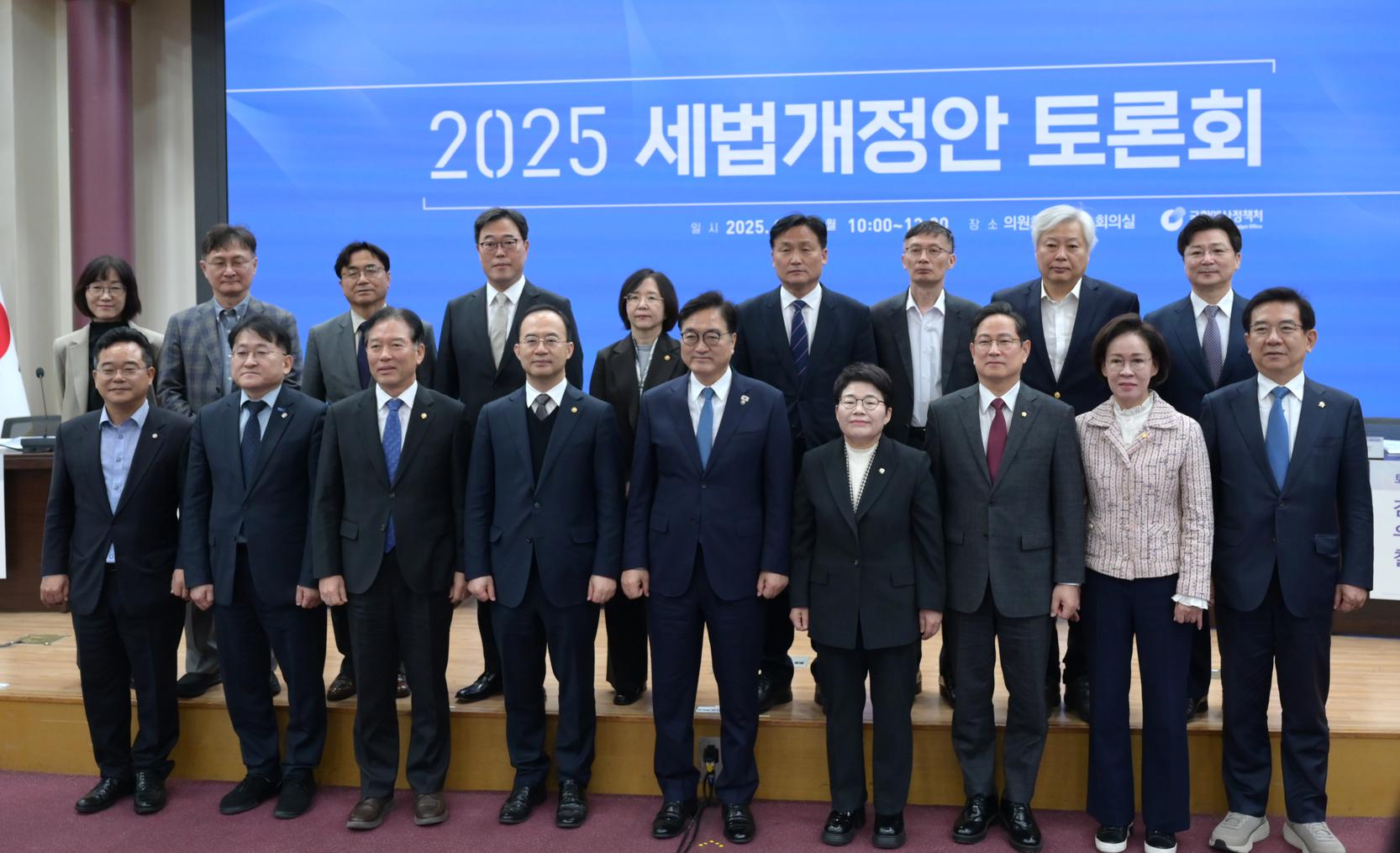
NABO Holds the Grand Debate on the 2025 Tax Reform Proposals The National Assembly Budget Office held the Grand Debate on the 2025 Tax Reform Proposals on Monday, November 10, at 10:00 AM in the first conference room of the National Assembly Members' Building to discuss major issues and improvement tasks related to the tax reform proposals. In his opening remarks, NABO Chief Chi Dong-ha stated, "This government's tax reform proposal is the first revenue-increasing reform pursued in eight years since 2017, and it is expected to expand the revenue base centered on corporate tax and securities transaction tax, while strengthening tax support for industrial development including national strategic technologies." National Assembly Speaker Woo Won-shik emphasized the importance of tax policy as an issue that all citizens can relate to, and conveyed words of encouragement, saying, "I hope the National Assembly will consider various perspectives and produce balanced results, as taxation goes beyond raising revenue to serve as a mechanism for promoting industrial development and protecting the socially vulnerable." Chairperson Lee-ja Lim of the National Assembly Strategy and Finance Committee stated in her congratulatory remarks, "I expect that today's debate will share diverse opinions on major issues in the government's '2025 Tax Reform Plan,' including the increase in corporate tax rates and education tax rates, and the introduction of separate taxation on dividend income for high-dividend companies. I will do my best to ensure thorough review of the tax reform proposals in the Strategy and Finance Committee." The debate was moderated by Professor Park Ki-baeg of the Tax Accounting Department at the University of Seoul. Park Geum-cheol, Director of the Tax Policy Bureau at the Ministry of Economy and Finance, who presented the first topic, outlined the basic direction of the government's 2025 tax reform plan as tax support for economic development, livelihood stability for ordinary people and the middle class, and expansion of the revenue base to support the role of fiscal policy, while explaining the implementation progress and expected effects of measures such as expanded support for future strategic industries including AI, the introduction of separate taxation on dividend income for high-dividend companies, and the restoration of corporate tax rates. Sang Ji-won, Director General of the Estimates and Tax Analysis Division at NABO, who presented the second topic, evaluated this year's government tax reform proposal as a revenue-increasing tax reform that strengthens policy support for nurturing strategic industries and revitalizing capital markets, as well as the revenue generation function, and suggested that efforts to expand the revenue base should continue, but fiscal management is needed to use those resources to expand the foundation for future growth. Following the presentations, discussions ensued. Jung Tae-ho (Democratic Party), vice chairman of the Strategy and Finance Committee, who took the floor as the first discussant, evaluated that this tax reform proposal restored the role of sustainable fiscal policy in that it normalized the previous government's corporate tax reduction measures, managed tax expenditures within legal limits, and secured financial resources for education and balanced regional development by raising the education tax rate for financial and insurance companies with profits exceeding 1 trillion won. Park Soo-young (People Power Party), vice chairman of the Strategy and Finance Committee, pointed out that efforts to reduce spending are needed rather than increasing revenue through tax rate hikes to achieve fiscal balance, and that this year's tax reform proposal deviates from the principle of taxation: 'low rates, broad base.' He also argued that while property holding tax increases should be approached cautiously, transaction tax reductions are necessary, and reforms such as education tax reductions and abolition of inheritance tax between spouses should be pursued. Cha Gyu-geun, member of the Rebuilding Korea Party and the Strategy and Finance Committee, viewed this tax reform proposal as significant in terms of revenue expansion. However, he argued that in detail, realistic measures need to be considered, such as providing benefits for differential dividends centered on small shareholders in the case of separate taxation on dividend income, and that discussions on the overall financial taxation system, including capital gains tax on stocks, should be resumed while seeking ways to improve the effective corporate tax rate. Chun Ha-ram, member of the Reform Party and the Strategy and Finance Committee, pointed out that the corporate tax rate increase is undesirable for the international competitiveness of Korean companies, and that global trends need to be comprehensively considered. He also argued that in the case of separate taxation on dividend income, artificial dividend promotion may cause distortions in the stock market and corporate management, and that proactive tax policies are necessary for balanced regional development. Professor Jeong Se-eun of the Economics Department at Chungnam National University evaluated that while this tax reform proposal is meaningful in that it halted the previous government's tax reduction policies, the revenue base has not yet sufficiently recovered. She also emphasized that expectations regarding the effects of easing dividend income taxation are somewhat exaggerated, and that there is a need to comprehensively redesign the asset tax system with awareness of deepening asset inequality. Professor Kim Woo-cheol of the Tax Accounting Department at the University of Seoul, the final discussant, believed that even if revenue expansion is necessary, careful consideration is needed in choosing the timing of tax increases given economic recovery. He also evaluated that increases and frequent adjustments to corporate tax rates are undesirable in terms of the business environment and investment revitalization, and that the unannounced education tax increase appears to lack policy consistency. 2025-11-12
-
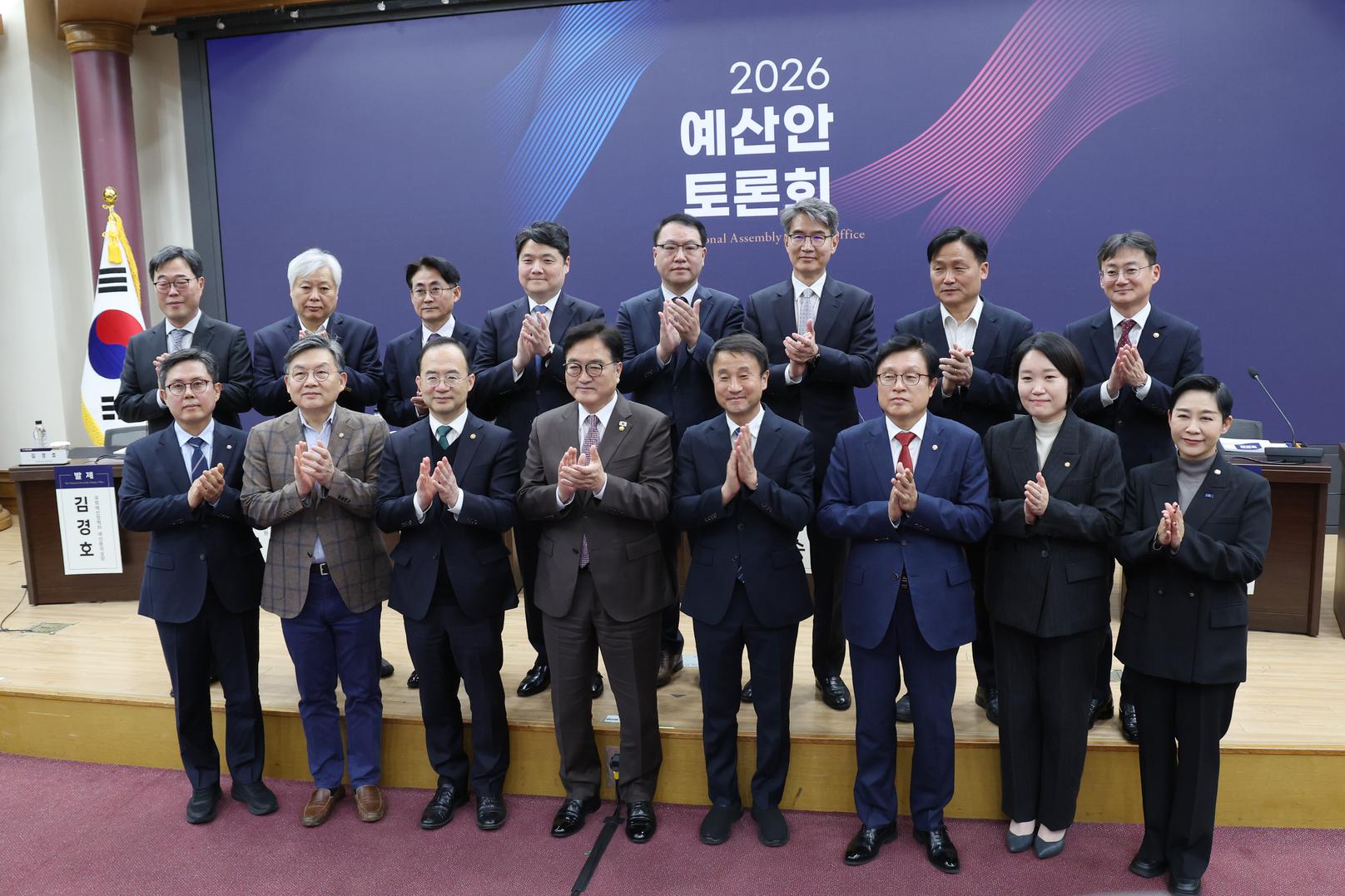
NABO Holds Grand Debate on the 2026 Budget Bill The National Assembly Budget Office held its Grand Debate on the 2026 on Monday, November 3, at 2 pm in Conference Room 1 of the National Assembly Members’ Building. The debate aimed to establish proper directions for the National Assembly’s examination of the government’s budget proposal. In his opening remarks, NABO Chief Dongha Chi stated, "This forum will help identify the main issues that need to be discussed during the budget review process, as well as the positions of the ruling and opposition parties." He added, "I hope we can have meaningful discussions about how to use government spending to improve people's lives, ensure important projects are effective, and maintain healthy government finances for the long term." National Assembly Speaker Won-shik Woo highlighted the importance of government spending in his message, saying, "Government finances play a crucial role in supporting people's livelihoods during these challenging times of climate crisis, low birth rates, aging population, and declining local communities." He emphasized the need for "a strong tax base and cutting unnecessary spending so the government can focus resources where they matter most." He also urged both parties to work together to pass a budget that meets public expectations within the legal deadline, noting that this is the first budget prepared by the new government. Byung-do Han, Chairman of the Special Committee on Budget and Accounts, stressed that "next year's budget focuses on 'recovery and growth,' and we need active government spending to overcome challenges like slow economic growth, regional inequality, and disappearing local communities." He promised that "the committee will carefully review the budget to ensure government spending helps restore the economy and reflects what the people need." The forum was moderated by Professor Jung-su Park of Ewha Womans University. Presentations were given by Byung-seo Yoo, Deputy Minister for the Budget Office at the Ministry of Economy and Finance, and Kyung-ho Kim, Director General of the Budget Analysis Department at NABO. This was followed by panel discussions with National Assembly members So-young Lee, Hyeung-soo Park, and Jae-won Kim from the Special Committee on Budget and Accounts, as well as Woo-hyun Jang, Director of the National Accounting and Finance Statistics Center at the Korea Institute of Public Finance, and Professor Woo-chul Kim from the University of Seoul. Byung-seo Yoo from the Ministry of Economy and Finance explained the 2026 budget plan for "recovery and growth." He said the government plans the biggest-ever spending reform and aims to create positive economic cycles through active government spending and performance-based budget management. He outlined three main investment priorities and their key goals. Kyung-ho Kim from NABO presented his analysis of the 2026 budget plan. He noted that with slow domestic consumer spending and growing international uncertainties, the government plans to maintain increased spending. However, he pointed out a concerning trend: while government debt compared to GDP is decreasing in major developed countries, Korea's debt continues to grow. He said this means Korea needs to work on making its finances more sustainable. He also suggested improvements needed for AI funding, trade-related spending, and policy fund budgets. So-young Lee, rep. of the Democratic Party and vice chairperson of the Special Committee, said she agrees that the government needs to increase spending to restore the economy, especially given recent economic uncertainties and tax revenue shortfalls. She promised to ensure adequate funding for urgent national priorities like AI while checking for wasteful spending, making sure the budget benefits the people and showing bipartisan cooperation. Hyeung-soo Park, rep. of the People Power Party and vice chairperson of the Special Committee, noted that the level of spending cuts in next year's budget is similar to previous years, and Korea's national debt is high compared to similar countries, showing difficult financial conditions. He said that for the budget to prepare for the future rather than just provide short-term stimulus, it needs to reduce total spending, restructure new projects, boldly eliminate duplicate and inefficient programs, ease tax burdens, restore private investment, and ensure long-term financial sustainability. Jae-won Kim, member of the Rebuilding Korea Party, argued that the 2026 budget should be examined to see if it fixes the problems caused by the previous government's extreme budget cuts and selective spending, and whether it truly aims to improve people's lives. She specifically called for new funding to support youth employment in local areas, safety protections for overseas workers, comprehensive support for Koreans living abroad, and increased cultural funding to support the growing K-culture industry. Woo-hyun Jang from the Korea Institute of Public Finance praised the budget as showing the government's efforts to address current challenges. He emphasized that with this active spending approach, it's important to manage and evaluate programs based on evidence and results to ensure the future develops in the right direction. He also noted that now is the time to improve fiscal management systems to make better budget decisions. Finally, Professor Woo-chul Kim from the University of Seoul said that despite increased spending, the 2026 budget lacks real changes in priorities or policy direction. He specifically criticized the absence of aggregate fiscal management and warned that Korea's financial health is approaching a critical point, making it essential to have effective medium- and long-term fiscal plans. 2025-11-03
-
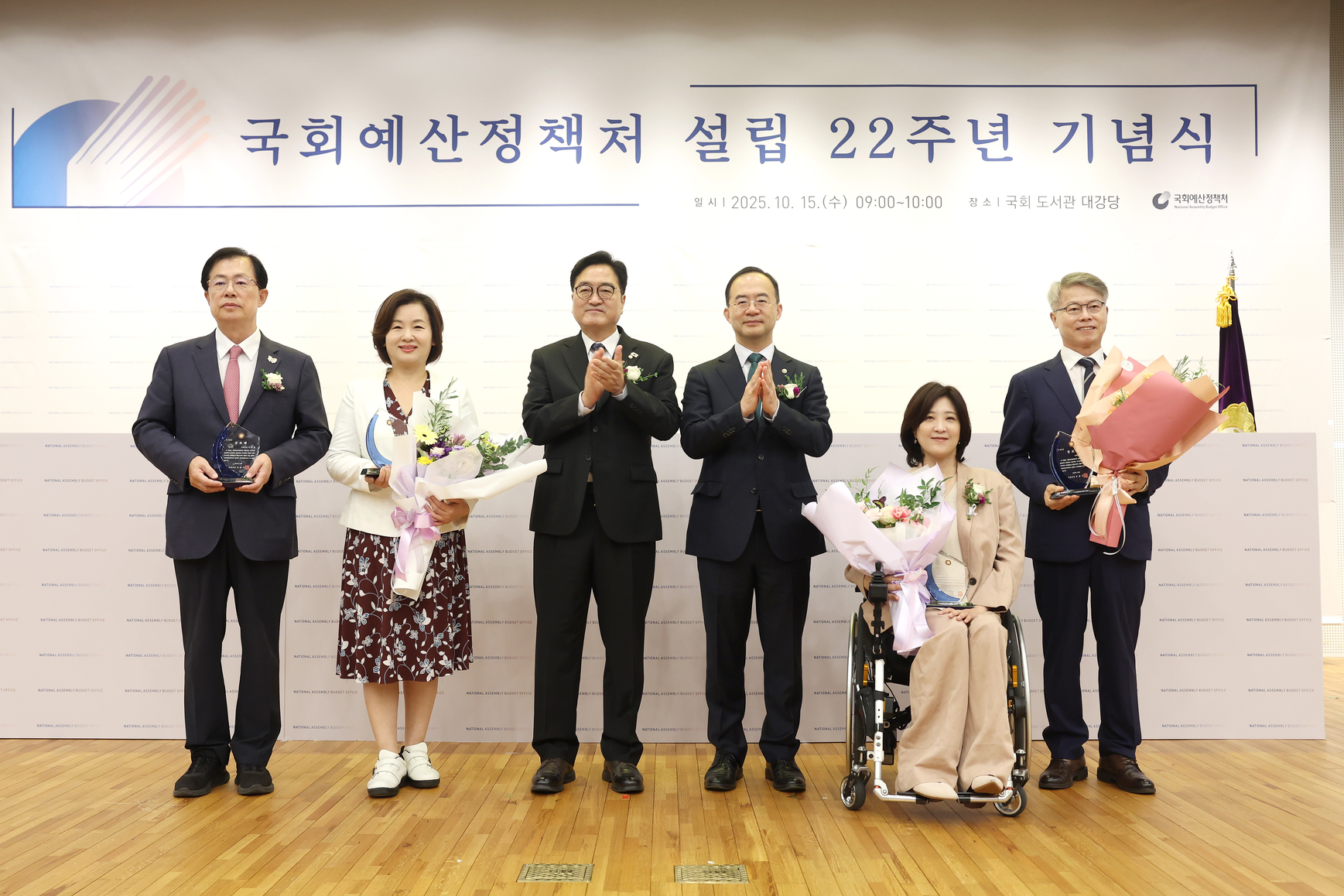
NABO Holds 22nd Anniversary Ceremony The National Assembly Budget Office held its 22nd anniversary ceremony on Wednesday, October 15, at 9 AM in the National Assembly Library auditorium. National Assembly Speaker Won-shik Woo, Rep. Hyungbae Min, Soojin Lee, and Chinook Chung from the Democratic Party, Rep. Manhee Lee, Boyun Choi, and Hyungdu Choi from the People Power Party, and numerous staff members attended the event. The ceremony included a commemorative address by NABO Chief Dongha Chi, presentation of merit plaques by Speaker Woo, acceptance speeches, and a cake-cutting ceremony. The Speaker's Merit Plaques were awarded to lawmakers who utilized NABO's services to enhance the Assembly's standing: Democratic Party Representatives Hyungbae Min, Joonbyeong Yoon, and Soojin Lee, and People Power Party Representatives Manhee Lee and Boyun Choi. Speaker Woo praised NABO's contributions to expanding legislative support activities and urged the office to continue providing in-depth analysis and policy alternatives for rational decision-making. Chief Chi attributed the 22-year achievements to support from lawmakers and staff dedication, pledging to become "the premier fiscal institution recognized and trusted by the National Assembly and the Korean people through objective and professional alternatives." NABO was established on October 19, 2003, to research and evaluate national budget, account settlement, fund, and fiscal management matters while supporting legislative activities. 2025-10-16
-
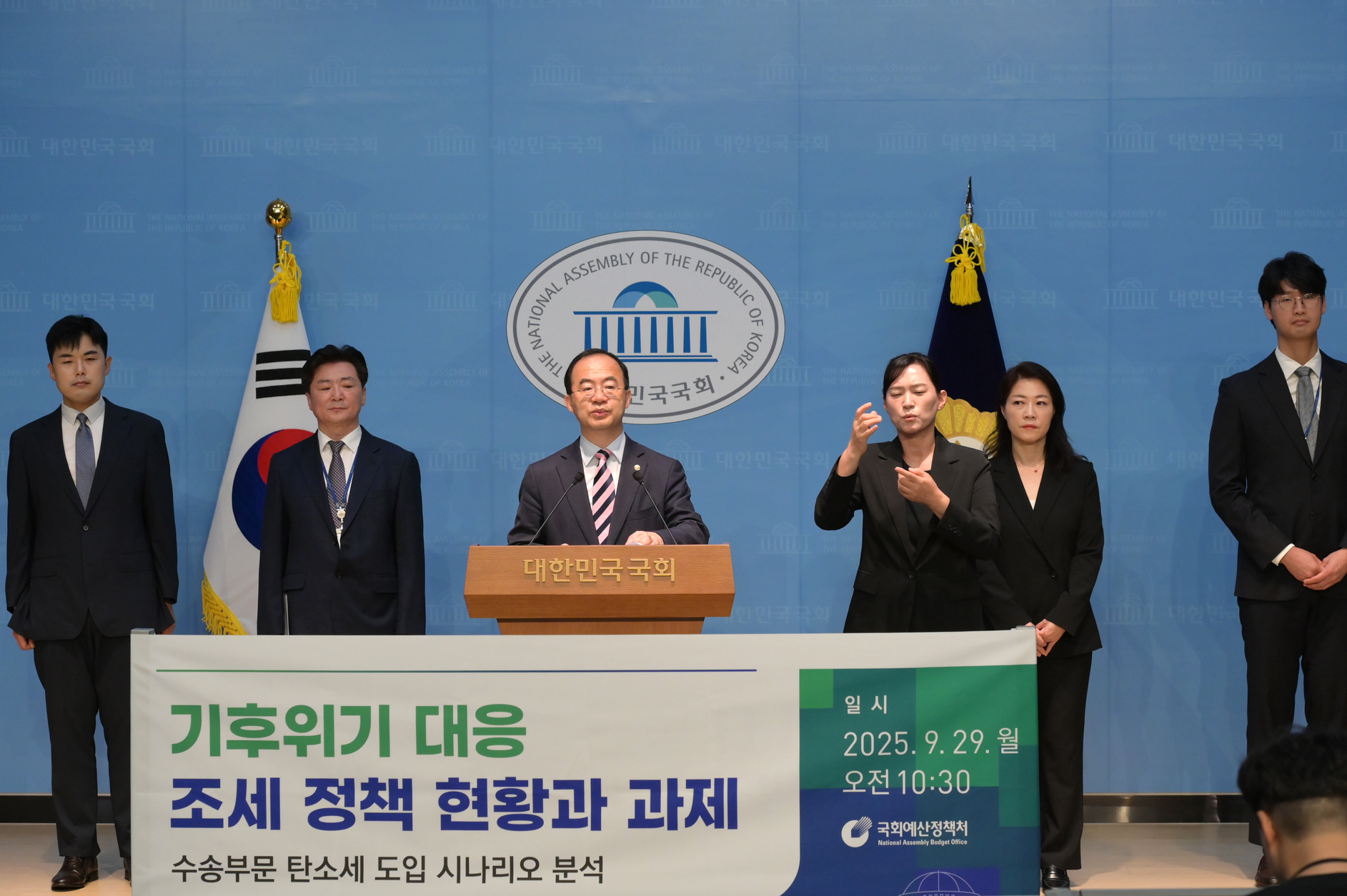
Press Conference on Tax Policy for Climate Change Response: Status and Challenges in Korea The National Assembly Budget Office held a press conference on recently published report, Tax Policy for Climate Change Response: Status and Challenges in Korea, on Monday, September 29, at the National Assembly Press Room. The press conference was conducted through a briefing by NABO Chief Dongha Chi, which introduced the role of tax policy in responding to the climate crisis and future challenges, domestic carbon tax legislation and research trends, and key issues. In the briefing, Chief Chi stated, "Korea's tax policy does not provide sufficient signals to induce carbon reduction as a response to climate crisis. Therefore, it will be necessary to establish a tax rate system that considers carbon emissions, strengthen tax support to promote low-carbon investment and technological innovation, and enhance complementary links between the tax system and greenhouse gas reduction-related systems such as the emissions trading scheme." He added, "We expect this research to serve as meaningful reference material for the National Assembly's climate crisis response activities, including the Special Committee on Climate Crisis." 2025-09-30